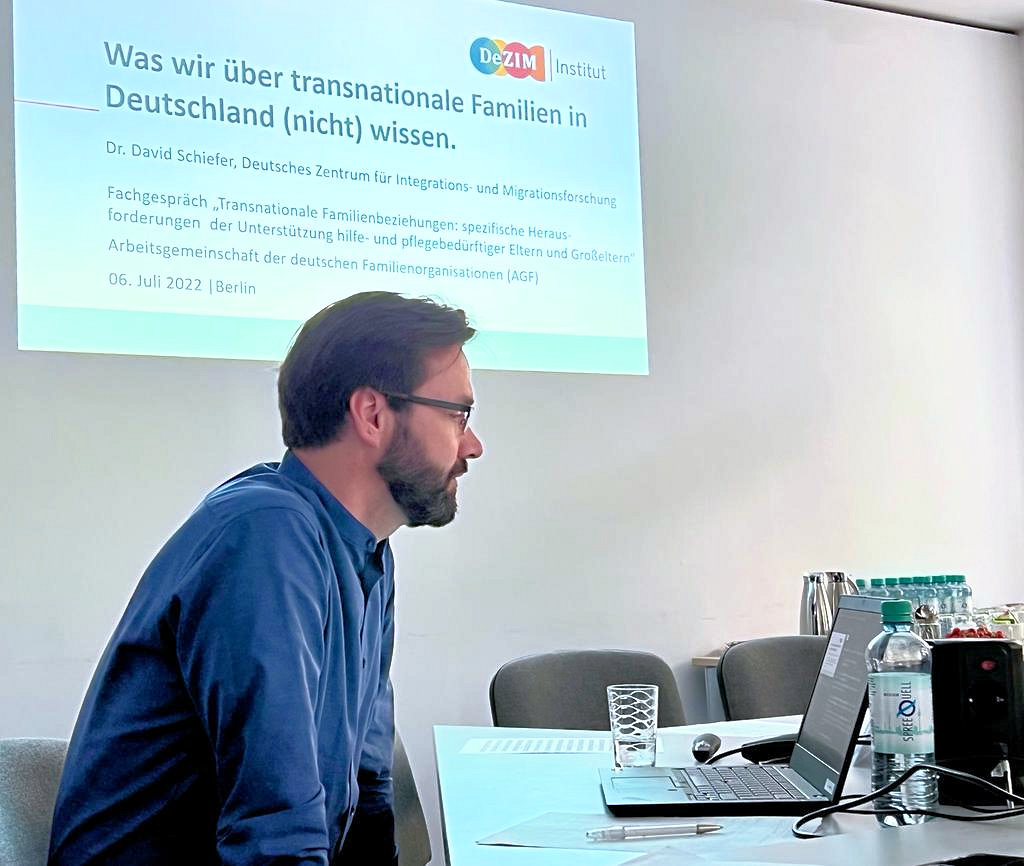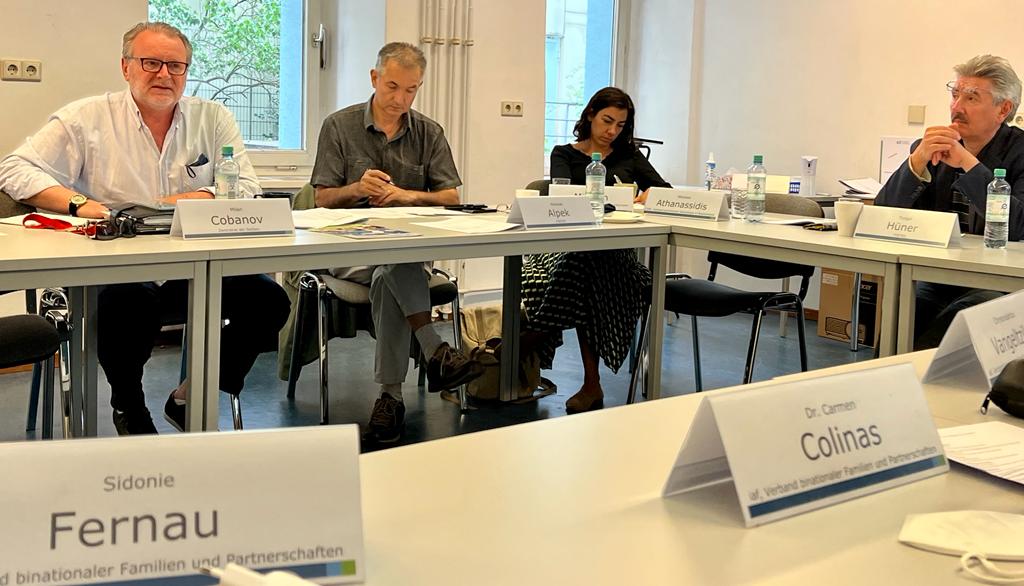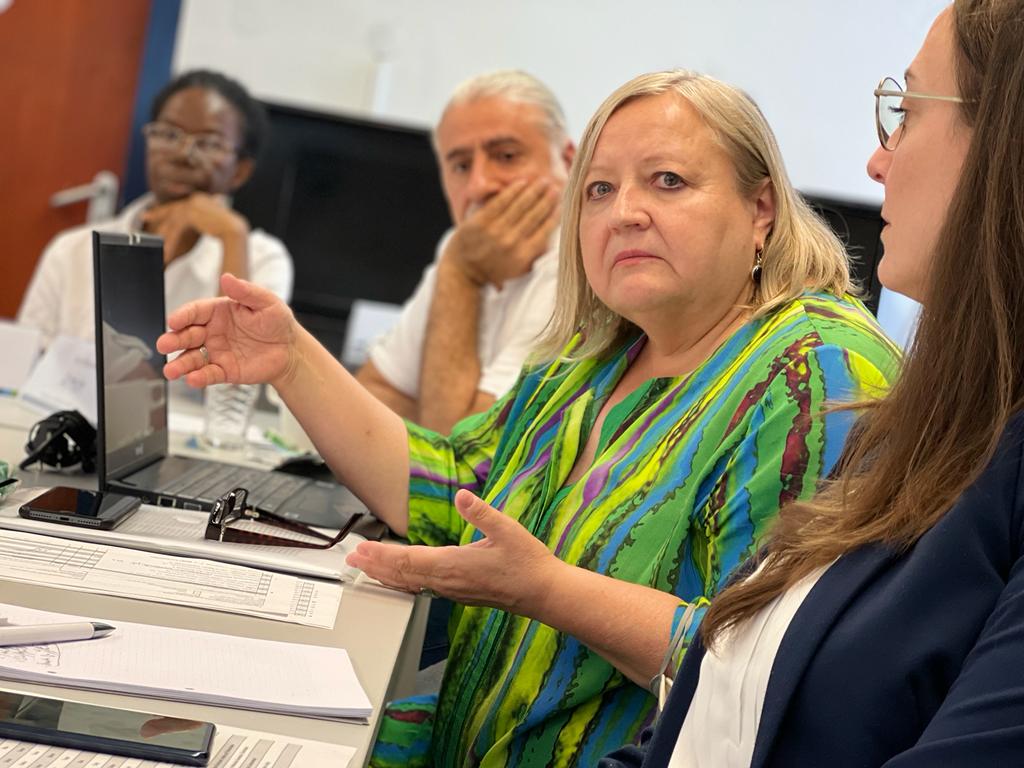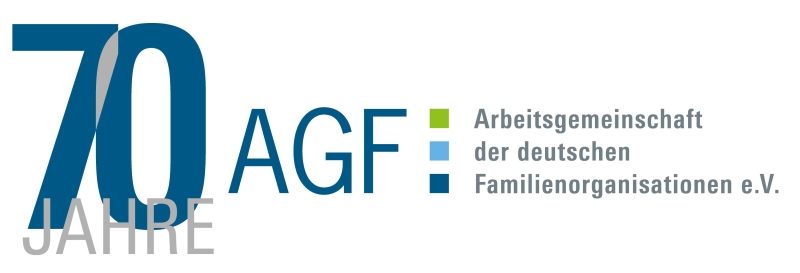Although great progress has been made in migration research in recent decades, there are still unanswered questions regarding transnational, intergenerational support relationships. The particular difficulties faced by older people in need of care and their relatives in transnational family relationships are rarely discussed in care and family policy contexts. Furthermore, there are deficits in both knowledge and implementation with regard to the needs-based design of welfare state support services for transnational families with (grand)parents in need of help and care.
The above-mentioned aspects were the focus of this expert discussion, which at the same time served to enable participants to learn more about one another and the network actors from the family policy sector and migrant self-help organisations.
Specific challenges in supporting parents and grandparents in need of help and care in transnational family relationships arise in various family constellations. These include families in which the adult children of working age have migrated and their ageing parents have stayed behind in their country of origin. They also include families in which the parents or grandparents have returned to their country of origin after working in Germany and the adult children and grandchildren remain in Germany. A further group are families in which the parents or grandparents want to spend their old age as commuting migrants partly in Germany and partly in the country of origin.
As early as 2000, the federal government’s Third Report on the Elderly stated that the image of the majority of society – but also of some professionals involved in delivering welfare – regarding (transnational) family support networks tended to be at one or other extreme of the spectrum. At one extreme, families may be seen as being torn apart by migration. Under acculturation pressure, the children’s generation has become alienated from the parents’ generation and is increasingly reluctant to help the elderly. At the other extreme, migrant families are idealised: Family and kinship relations represent an indestructible solidarity, characterised by a massive transfer of material goods and support.
Dr. David Schiefer from the German Centre for Integration and Migration Research was invited to give an introductory talk contrasting these continuing stereotypes with more recent research results.
| AGF activities in the field of care The expert discussion on the specific problems and needs of transnational family constellations followed on from a series of events that the AGF has held on the care of older family members in recent years. For example, the AGF had dealt with the current report on the elderly and the topic of the effects of digitalisation on the care of older family members and held an expert discussion on families with chronically ill family members. Last year, a European Expert meeting was held on the support of older people in private households by foreign caregivers, so-called live-in care.. The focus was on the consequences for families in Germany, as well as for children and elderly relatives in the Eastern European sending countries. The AGF is also actively involved in the advisory board of the Ministry of Family Affairs on the reconciliation of long-term care and professional work. Furthermore, the AGF is an active member of the Family ministry’s independent council for reconciling care and professional work. |
Transnational families

According to Dr. Schiefer, transnational families characteristically live separately in two or more countries, but still have a sense of joint family identity and connectedness and assume care responsibilities for each other across borders. “Real” transnational families, moreover, have family networks in the respective countries and not just individual or scattered family members.
Transnational practices that create and maintain cross-border family identity in terms of “doing family” may include communication, support and care and visits.
Regular communication is central to creating “closeness despite distance”. Technological developments have accelerated the exchange of information. Information that used to be exchanged by letter, which often meant long waits for replies, can now be discussed quickly or even instantly by email, messenger, telephone and video calls. However, the letter still has high value as a personal and thoughtful medium. The mechanisms for communicating the situation and needs of parents and grandparents are the same as those that relate to other “sensitive” topics. Often, there is an imbalance of power in this respect because of proximity or distance. Children who live close to their elderly parents are often better informed about the health of their parents than children in another country. Non-communication, i.e. not talking about certain topics, also plays a role. However, this can partly be interpreted as a desire to protect relatives living at a distance.
Mr. Schiefer explained that transnational care and support within families include both services to deal with the real and urgent needs of the families and actions and gifts that are more symbolic. He highlighted that, thanks to new technology, practical support can be given at a distance, for instance organising care and assistance for relatives in another country. Emotional support at a distance includes listening and comforting when there are problems. However, transnational relationships may be weakened if, for example, grandchildren cannot communicate with grandparents because they have not learned the family’s language of origin. Visits serve to refresh relationships and to better understand the realities of the other family members. However, in spite of the positives, visits were sometimes found to be rather ambivalent, causing stress because of high expectations or by having to live at close quarters during the visit.
Mr. Schiefer observed that money transfers to family members have great significance. In the case of parents or grandparents who need assistance, such transfers can help to meet medical and care costs. However, money transfers sometimes have a symbolic meaning if there is no real financial need in the country of origin, especially for the senders, who might otherwise feel guilty or ashamed for not being able to provide practical and emotional support locally.
In his experience, transnational family practices and mutual support relationships are influenced, among other factors, by prevailing ideas about age, family and gender roles, the limited possibilities to give or receive help because of physical distance, the family’s economic situation and the emotional connections within the family. < /br>Overall, transnational relationships between adult children and their parents abroad are not uncommon in Germany. Although family relationships are very diverse, intergenerational care and support are often maintained across borders. However, this is much more complex than for families living close to each other.
Discussion and experiences of the participating organisations

The participating self-help organisations reported on specific problems of the respective migrant groups against the background of their counselling work. It became clear that the problems involved in supporting parents and grandparents who need care and assistance are more or less severe depending on the country of origin. In the case of countries from which young workers have recently been recruited, for example for employment in the IT sector, the issue has hardly been relevant so far. The parents in the country of origin are usually not very old. The issue is more relevant for families from the countries where guest workers were historically recruited, even if first-generation migrants have already mixed with second- and third-generation migrants. A further distinction needs to be made between migrants from EU countries, those from third countries and refugees. Special features also exist among binational partnerships, as different values regarding the care of older family members can collide there

It was agreed that often the difficulties associated with transnational support for elderly family members were still perceived as individual problems that everyone had to solve for him- or herself. For example, it was largely seen as “normal” for migrants to bear very high indirect costs, such as using their entire annual leave to care for parents in their home country.
The association of binational families and partnerships, iaf countered this by saying that countries of immigration should give more consideration to the situation of people with a migration history who have parents abroad in need of care. Germany, for example, is trying to attract qualified workers worldwide. However, these skilled workers have parents who may develop a need for help and care as they grow older. For this group, the state has a duty to facilitate a balance between work and transnational care and support.
As Dr. Schiefer had already explained in his presentation, he saw four political starting points for improving support for older family members in transnational families: state regulations on migration, residence and integration, state support systems for older people, measures to help reconcile care and employment, and finally the infrastructure for information, communication technologies and mobility.
Further suggestions came from the migrant organisations on how to reduce the specific burdens of transnational support for older family members. One was to facilitate family reunification for older family members, creating options for long-term care insurance that would allow benefits to be “carried over” in the case of remigration, and promoting working-time models that help people support parents and grandparents in need of care living abroad.
The association of binational families and partnerships, iaf will explore the topic further at its family policy symposium in Frankfurt on 15 September 2022. The title of the conference is: „“Family policy across borders – transnational family relationships and age” “.

